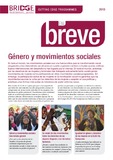Gender and Social Movements
Genre et mouvements sociaux;
Género y movimientos sociales
| dc.contributor.author | Horn, Jessica | |
| dc.date.accessioned | 2021-10-12T12:20:47Z | |
| dc.date.available | 2021-10-12T12:20:47Z | |
| dc.date.issued | 2013 | |
| dc.identifier.citation | Horn, J. (2013) Gender and Social Movements, Research Brief, BRIDGE, Brighton: Institute of Development Studies | en |
| dc.identifier.isbn | 978-1-78118-125-6 | |
| dc.identifier.uri | https://opendocs.ids.ac.uk/opendocs/handle/20.500.12413/16880 | |
| dc.description.abstract | Social movements worldwide are a critical force for progressive social transformation, and have proven effective in generating change at levels that policy, law and development interventions alone have not achieved. Women’s rights activists and feminists globally have been active both in building women’s movements and participating in other progressive social movements. However, women’s active participation in social mobilisation does not guarantee that movements will take on the struggle for women’s rights or embrace more just forms of gender power relations in their politics and practice. IN 2013 This In Brief explains why it is so important for all progressive social movements to commit to thinking about and transforming women’s rights and patriarchal power relations, both in their external-facing activism and their internal cultures and practices. It considers some of the challenges that movements face in doing this, and sets out some ‘routes to gender-just movements’ that can be tried and adapted in different mobilisation settings. The two case studies, produced collaboratively with activists and movement leaders, illustrate some of these routes in action: in the global human rights movement, and the CLOC-Via Campesina movement in Latin America. | en |
| dc.description.abstract | Dans le monde entier, les mouvements sociaux sont une force cruciale de progrès social et se sont avérés capables de déclencher des changements à des niveaux que la politique, le droit et les interventions de développement n’ont pas à eux seuls permis d’atteindre. Partout, les militants et militantes des droits des femmes et les féministes ont construit des mouvements de femmes et ont participé à d’autres mouvements sociaux progressistes. Mais la participation active des femmes à la mobilisation sociale ne garantit pas que les mouvements s’impliquent dans la lutte pour les droits des femmes ou adoptent des formes plus justes de rapports de pouvoir entre hommes et femmes dans leurs idées politiques et dans leurs pratiques. | fr |
| dc.description.abstract | En todo el mundo, los movimientos sociales son una fuerza crítica para la transformación social progresista y han demostrado ser eficaces en cuanto a generar cambios a niveles que las políticas, leyes e intervenciones del desarrollo no han logrado por sí mismas. En todo el mundo, activistas por los derechos de las mujeres y feministas han trabajado activamente tanto construyendo movimientos de mujeres como participando en otros movimientos sociales progresistas. Sin embargo, la participación activa de las mujeres en la movilización social no garantiza que los movimientos asuman la lucha por los derechos de las mujeres o acepten en sus políticas y prácticas unas formas más justas de relaciones de poder entre los sexos. | es |
| dc.language.iso | en | en |
| dc.publisher | Institute of Development Studies | en |
| dc.rights.uri | http://creativecommons.org/licenses/by/3.0/ | en |
| dc.subject | Gender | en |
| dc.title | Gender and Social Movements | en |
| dc.title | Genre et mouvements sociaux | fr |
| dc.title | Género y movimientos sociales | sp |
| dc.type | Other | en |
| dc.rights.holder | © Institute of Development Studies 2013 | en |
| rioxxterms.funder | Default funder | en |
| rioxxterms.identifier.project | Default project | en |
| rioxxterms.version | VoR | en |
| rioxxterms.funder.project | 9ce4e4dc-26e9-4d78-96e9-15e4dcac0642 | en |
Files in this item
This item appears in the following Collection(s)
-
BRIDGE [11]




